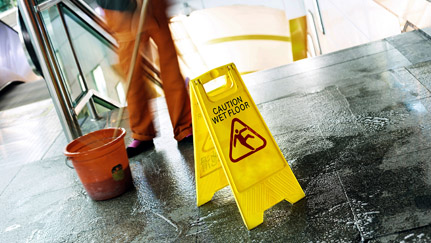Preventing slips and falls

Take steps to help prevent slips, trips and falls on your interior floors and exterior property.
Advice for before and after a slip-and-fall injury
According to the National Floor Safety Institute, falls account for over 8 million hospital emergency room visits, representing the leading cause of visits.1
Potential risk to your business
A slip and fall can happen anywhere an employee or a member of the general public walks while on your premises. Mishaps can occur in parking lots, lobby areas, kitchens, bathrooms, employee break rooms, warehouses and shop areas, as well as on sidewalks and any exterior walkways. No business owner wants to see an employee or customer get hurt. Plus, as today’s headlines often remind us, slip-and-fall injuries are often the basis for damaging lawsuits.
Ways to steer clear of slip-and-fall dangers
Nationwide Loss Control Services has created a FLOORS resource, which reinforces ways to reduce the potential for a slip, trip and fall. Other steps you can take include:
- Keep all walkways and stairways free of debris and clutter.
- Make sure handrails on all stairs and steps are secure. Equip all steps with abrasive strips or a nonskid surface.
- Inspect all tables and chairs/booths weekly for any needed repairs.
- Place rubber-backed mats in lobby areas when inclement weather is expected. This will help soak up water tracked into the building.
- Mop up any spilled fluids on the floor immediately. Place “wet floor” signs in the spill area until the floor is dry. Keep your mops and mop buckets clean and free of grease with the use of an approved detergent for your floor type, and hang your mops up to dry after each use. This will not only provide you with a cleaner and safer floor, but your mops will also last longer.
- Use a grease-cutting solution when mopping up floors with a greasy coating. Kitchens, fast-food customer service areas and shop areas all present this hazard. A portable floor dryer can help speed the drying process.
- Dry mopping should be performed to make sure the floor area is dry upon completion of the clean up.
- Put on slip-resistant footwear. When working in areas where floor tile may have a greasy coating, the soles of these shoes reduce the potential for a slip and fall.
- Use floor tile with a grit built into the top finish. This tile is used mostly in kitchen areas, where the grit helps shoes grip the floor.
- Do not use any type of extension cords in general public areas.
- Paint tire stops and curbs in walking paths “traffic yellow” for visibility. Be sure to repaint as needed.
- Remove snow and ice from parking lots and sidewalk areas promptly. To help prevent refreezing of melted snow and ice, also use ice melt and sand, as needed. The grit from the sand will help provide traction when walking in these areas. Completely clear curb and gutter areas that can be hidden from a person’s view.
- Direct gutter downspouts to drive water away from walkways.
- Inspect sidewalks and parking lots regularly for tripping hazards such as cracks or uneven surfaces. Make any necessary repairs promptly and detour walking traffic until fixed.
- Routinely inspect all interior and exterior lighting to guarantee proper illumination. Conduct monthly tests of all emergency lighting.
- Be better prepared to clear sidewalks by checking local weather reports regularly.
- Contact Nationwide Loss Control Services. We can provide onsite evaluations to assist in preventing slips and falls.
Act fast when an injury occurs
Injuries can range from low-impact falls where the person needs no medical care to “very serious” falls where the person requires immediate medical attention, especially for head and neck injuries, broken bones and open wounds. Whenever someone suffers a slip and fall:
- Immediately check the condition of the injured person. Call an ambulance to take the person to the hospital if the injury is severe. Offer minor first aid if you have a trained first aid person on staff.
- Obtain basic information from the injured person. Use an incident report form to record the individual’s name, address, phone number and a description of his/her injury.
- If an employee is injured, report the injury to our Nurse Triage Hotline at 855-777-7090. A registered nurse will help assess the need for medical care on non-life-threatening injuries and will file a Workers’ Compensation claim for you, if needed.
- If a customer is injured, promptly report the injury to the Nationwide® claims unit at 1-800-421-3535. A quick response by a claims adjuster to the injured person can help ensure efficient and appropriate claims handling.
Providing solutions to help our members manage risk®
For your risk management and safety needs, contact Nationwide Loss Control Services: 1-866-808-2101 or LCS@nationwide.com.
